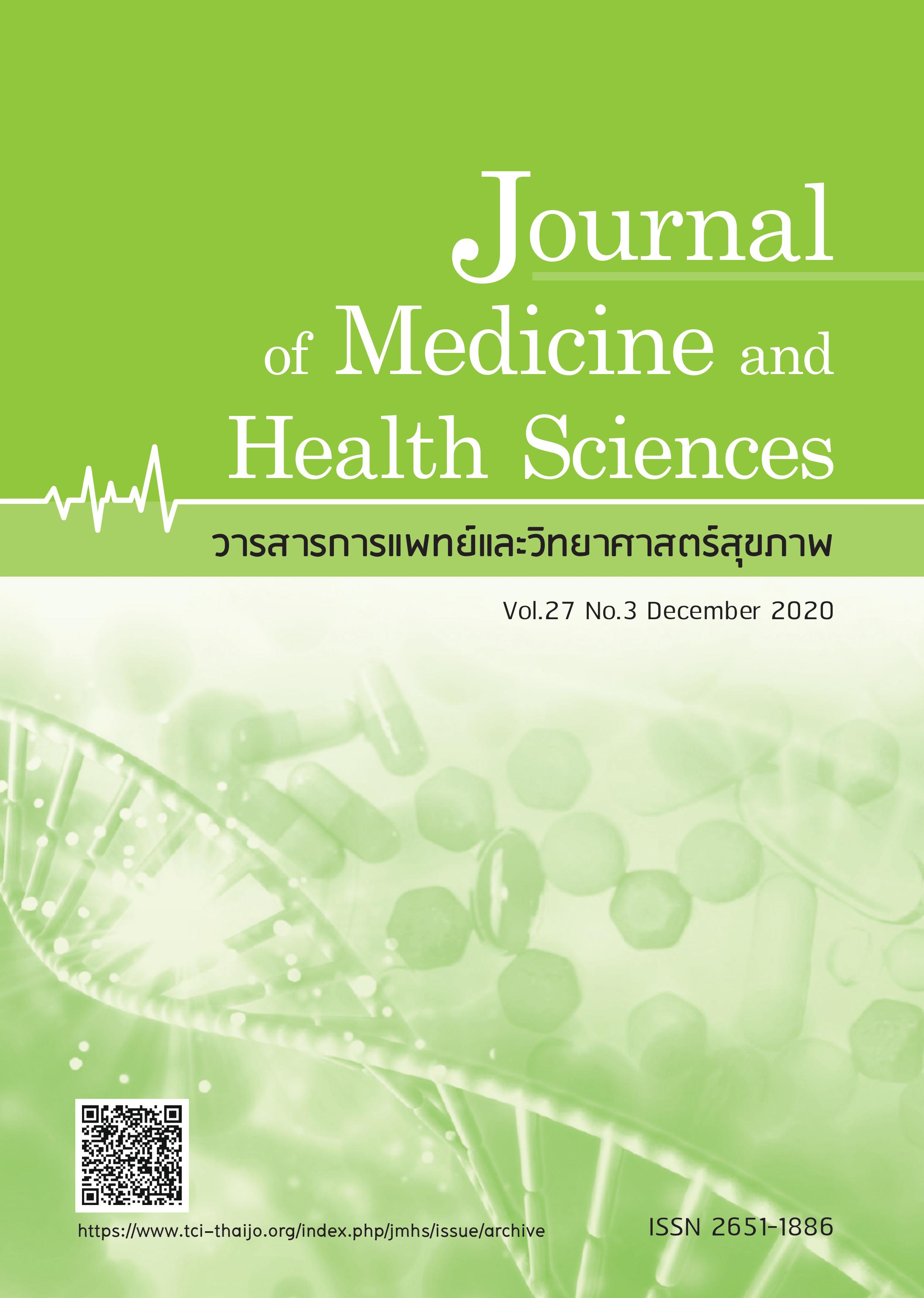National evaluation on implementation of chronic kidney disease clinics, under policy of Ministry of Public Health
Keywords:
chronic kidney disease clinic, Ministry of Public Health’s policy, evaluation, multi-disciplinary, chronic diseaseAbstract
Abstract
Chronic kidney disease (CKD) is currently one of the most considerable public health issues in Thailand. The Ministry of Public Health has set the service plan and implemented the policy for the CKD prevention and promoting health to reduce the risk of this disease. The objective of this study was to evaluate the results of the implementation of the Chronic Kidney Disease Clinic Policy under the Ministry of Public Health, Thailand. CIPP model was used as a guideline with the quantitative and qualitative study. The data was collected at 140 hospitals from 12 regional health Thailand with seventeen public health executives at the ministry level, 196 hospital administrators, 133 key practitioners, and 272 patients or their relatives by in-depth interviews and focus group discussions. 70.71% of the hospitals was established the CKD clinic by following the policy of the Ministry of Public Health and 22.14% by the hospital policy. 7.14% was not established the clinic because of the restrictions on place and budget. 82.31% of the hospitals that established CKD clinics have separated their own clinic from other services. 44.62% of the total have clarified the direction of the policy, target, and action plan. 14.62% evaluated communication and applied to improve communication to be more efficient. More than half of the hospitals (63.21%) reported that the supporting budget for CKD clinic was insufficient, and the funding was from their own operating budgets and National Health Security Office. In terms of human resource, 58.46% was operated by a multidisciplinary team including physician, nurse, pharmacist physical therapist, and nutritionist or Dietitians. However, 20.77% of hospital did not have the nutritionist. In addition, almost all of the hospital (95.38%) had implemented and maintained CKD patient databases, but only 42.31% of these contained all recommended clinical measures. However, most of those patient data were not analyzed for monitoring and tracking the progression due to the workload of the health professional. The use of data was mainly aimed at responding to report CKD’s key performance index to the Ministry of Public Health. The clinical outcome showed that eGFR of the CKD patients in the clinic increased more than 20%
References
[Available from: http://service.nso.go.th/nso/web/statseries/tables/00000_Whole_Kingdom/in-46-55.xls].
2. Ingsathit A, Shayakul C, Chaiprasert A. A project to study the disease progression and clinical outcome of chronic kidney disease in Thai population [Internet].Bangkok: Health Systems Research Institute (HSRI); 2017 [Available from: https://kb.hsri.or.th/dspace/handle/11228/4768?localeattribute=th.].
3. Jitraknatee J, Ruengorn C, Nochaiwong S.Prevalence and Risk Factors of Chronic Kidney Disease among Type 2 Diabetes Patients: A Cross-Sectional Study in Primary Care Practice. Scientific reports 2020;10:1-10.
4. Thawornchaisit P, Looze FD, Reid CM, et al. Health-Risk Factors and the Prevalence of Chronic Kidney Disease: Cross-Sectional Findings from a National Cohort of 87 143
Thai Open University Students. Global journal of health science 2015;7:59-72.
5. Jiamjariyaporn T, Ingsathit A, Tungsanga K, et al. Effectiveness of integrated care on delaying chronic kidney disease progression in rural communities of Thailand (ESCORT study): rationale and design of the study. BMC Nephrol 2014;15:99-105.
6. Department of Disease Control. Bureau of Non-communicable Diseases. Department of Disease Control, Ministry of Public Health. Annual Report 2015. Nonthaburi.
[Available from: http://www.thaincd.com/ document/file/download/paper-manual/Annual-report-2015.pdf].
7. Stufflebleam DL, Shinkfield, A. J. Evaluation Theory, Model & Application. Now York: Jossey-Bass; 2007. p. 768.
8. Costa-Requena G, Moreso F, Cantarell MC,et al. Health literacy and chronic kidney disease. Nefrologia 2017;37:115-7.
9. Singprasert R, Kanogsunthornrat N,Chailimpamontri W. Effect of Behavior Modification Program Led by Advanced Practice Nurse on Clinical Outcomes in Patients with Pre-dialysis Chronic Kidney Disease. Thai Journal of Nursing and Midwifery Practice 2018;5:57-74.
10. Kaenkong K, Anutrakulchai S, Lertsinudom S, et al. Effects of Health Behavioral Promotion Programs on Behavior to Slowing Progression in Patients with Chronic Kidney Disease at 1-3a Stage. Journal of Nursing and Health Care 2019;37:211-20.
11. Berns JS, Saffer TL, Lin E. Addressing Financial Disincentives to Improve CKD Care. Journal of the American Society of Nephrology. 2018;29:2610-2.



